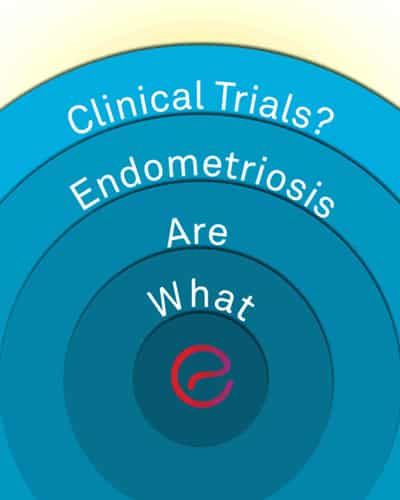Endometriosis Clinical Studies

Endometriosis is a condition in which endometrium-like tissue starts to grow in other parts of the body other than inside the uterus, leading to pain, discomfort, and sometimes infertility.
There is currently no cure for endometriosis. Excision surgery by an expert with considerable ability and experience is the “gold standard” for treatment.
There are also several ongoing clinical studies that are testing better ways to prevent, diagnose, or treat the condition.
What are clinical studies?
Clinical studies are of two kinds: interventional trials and observational studies.
Interventional trials involve participants receiving a new medication or procedure. Sometimes, investigators compare this to another treatment or a placebo that does not contain any active ingredients. The aim is to test the safety and efficacy of the new treatment or procedure. Researchers usually conduct interventional trials in several phases. The data from clinical trials can pave the way for approval of new treatments and procedures by regulatory bodies.
Observational studies, on the other hand, do not usually have interventions. Instead, they look into changes in participants over time. For example, they could study the effects of a certain lifestyle in a certain population. Observational studies help in advancing disease knowledge and may be able to identify avenues for future clinical trials.
What are the different phases?
Clinical trials often happen in successive phases to allow for a comprehensive study of a new treatment or device.
Phase 0: This is the first interventional testing. It takes place with a limited number of people. Results from a Phase 0 study establish a baseline to understand the mechanism of action of a particular treatment.
Phase 1: After a Phase 0 evaluation, the trial progresses to the Phase 1 stage. Here, researchers determine the optimal concentration of treatment that leads to the least side effects.
Phase 2: In Phase 2, researchers further optimize the concentration of the treatment in the intended patient population. They also consider combinations with other treatments.
Phase 3: In this phase, the trial enrolls a larger number of participants that researchers randomly assign to specific treatment groups called “arms”. The aim of this is to minimize any bias in the interpretation of results. While there can be several arms in a Phase 3 trial, the control arm usually receives the current standard-of-care treatment to which researchers compare the other arms. Results of Phase 3 trials are considered for regulatory approval and therefore, the patients enrolled are monitored very closely.
Phase 4: Trials in this phase involve testing interventions already approved by regulatory bodies such as the U.S. Food and Drug Administration (FDA). They help in understanding any side effects that may be apparent only in larger groups of people.
What are the benefits of enrolling in a clinical trial?
Enrolling in a clinical trial can be helpful in several ways. These include:
- Get access to new treatments before they are available on the market.
- Getting personal attention and care from researchers and clinicians.
- Receiving time-limited complimentary supply of the treatment or intervention, if applicable.
- Contributing to scientific discovery.
What are some of the things I should think of before joining?
Participating in clinical trials is completely voluntary. However, all trials carry some level of risk. So, it is important to make an informed decision before participating in a clinical trial. Here are some of the points you might want to clarify with the trial coordinator:
- What is the objective of the study?
- What treatment will you receive and what are the possible risks and side effects?
- Can you continue your current therapy during the trial?
- How long will the trial last?
- How often will you need to visit the trial center?
- Will you receive compensation?
- Will you have access to the study results during and after the trial?
- What is the benefit of your participation?
Where do I find information about clinical studies for endometriosis?
Information about past and ongoing clinical trials for endometriosis are available on the U.S. National Library of Medicine’s clinical trials website.
Here, you can find information about the study including the type and phase, start and estimated end dates, eligibility criteria, location of the trial, and available results so far.
What are the eligibility criteria?
Each clinical study has specific eligibility criteria that the team coordinating it decides based on age, gender, and either having or not having a particular disease.
For example, the Research OutSmarts Endometriosis (ROSE) study seeks to reduce the diagnosis time and discover improved treatments for endometriosis. To enroll in the ROSE study, participants must be non-pregnant, non-breastfeeding women above age 18 with or without endometriosis. Further eligibility will be ascertained after a telephone screen and analysis of menstrual effluents.
Get a Second Opinion
Our endometriosis specialists are dedicated to providing patients with expert care. Whether you have been diagnosed or are looking to find a doctor, they are ready to help.Our office is located on 872 Fifth Avenue New York, NY 10065.
You may call us at (646) 960-3080 or have your case reviewed by clicking here.